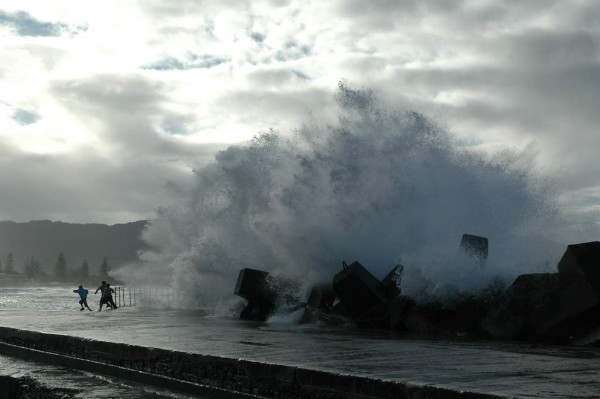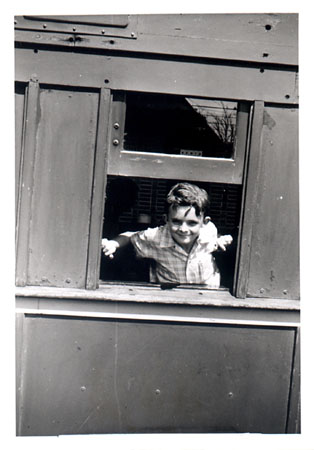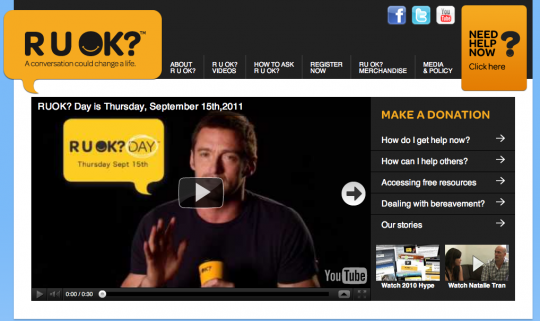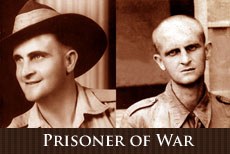Today is RUOK? Day. It is the 15th September 2011. I thought I would share some ideas that I have written about depression, anxiety and mental illness earlier in support of this excellent initiative.
Many people suffer from depression and anxiety. I do from time to time. The community should band together to deal with these challenges. It is a challenge. Sometimes when one mentions to others that you suffer from anxiety or depression they are accepting. Sometimes the opposite can happen. They push you away. I once had a boss whose initial reaction to my sharing was to ask me should I change jobs. Perhaps I should have asked that individual to change jobs. In effect they pushed me away. I shake my head in utter disbelief when I think about it today.
One in five children and adolescents is affected by mental health problems and disorders. Those aged 18‐24 have the highest prevalence of mental disorders of any age group.[1]
That is an alarming statistic. As I mentioned I have suffered from anxiety and depression. I do not at the moment. Things have been good. I remember suffering anxiety and depression during my years at school. I have suffered depression since. There may be gaps of 10 years or more between specific episodes but they happen. More on that in a future post.
Today is RUOK? day. There is an excellent site to support this initiative. As they explain on their web site:
Thursday 15 September, 2011 is R U OK?Day. It’s a national day of action which aims to prevent suicide by encouraging Australians to connect with someone they care about and help stop little problems turning into big ones.
On that day we want everyone across the country, from all backgrounds and walks of life, to ask family, friends and colleagues: “Are you OK?”.
Staying connected with others is crucial to our general health and wellbeing. Feeling isolated or hopeless can contribute to depression and other mental illnesses, which can ultimately result in suicide. Regular, meaningful conversations can protect those we know and love.
It’s so simple. In the time it takes to have a coffee, you can start a conversation that could change a life.
Ideas regarding depression, anxiety and mental health have been on my mind. It is still very much a taboo subject in our society. It is always surprising and disappointing to observe the ignorance and disdain reflected by others when the topic is raised. A metaphysical hand is raised before you and seemingly pushes you away. Immediate judgements are made.

Yet, reassuringly, the attitudes of society are changing and significant positive steps have been taken in recent years.
There are a variety of treatments for mental health problems and issues related to well-being. These treatments include Cognitive Behaviour Therapy, Interpersonal Therapy (IPT), Mindfulness-Based Cognitive Therapy, Positive Psychology, Counselling and Narrative Therapy. [2] There are others, including drug treatment.
What has been on my mind is this. There are students in our schools suffering from depression, anxiety and poor well-being. Many receive help. There is no doubt about that. Some students, however, fly under the radar. Regardless, the treatment takes place after the condition has been recognised.
I believe an approach based on the following principles could be adopted within our schools to enhance the existing initiatives and programmes. A proactive approach.
- Prevention rather than cure
- Awareness rather than ignorance
- Acceptance rather than rejection
Our students should be taught about the facts of well-being from an early age. It should be a measurably significant part of the curriculum. I believe this is commonsense. We teach our students to swim. Why not teach our students to live with an enhanced measure of well-being in their lives?
We could teach our students to:
- Think of mental health and well-being as a topic that can be raised without feeling self-conscious or fear
- Recognise the triggers and symptoms of poor well-being in themselves and those around them
- Seek assistance when they become aware of the signs of poor well-being
- Exercise self-help strategies when they feel anxiety, melancholy or anger, for example
- Consciously accept mental health as a factor within human society without exercising judgement
- Develop an understanding of the physiological components underlying mental health
There are initiatives happening within Australia. This is a good sign. It is an indication that the attitudes of society are changing. With respect to young people I would like to share some of the inititatives and resources with you.
Kids Matter. “KidsMatter aims to improve the mental health and wellbeing of children, reduce mental health problems amongst children, and achieve greater support for children experiencing mental health difficulties, and their families.” [3]
BeyondBlue SenseAbility. “SenseAbility is a strengths based resilience program designed for those working with young Australians aged 12-18. It consists of a suite of modules developed to enhance and maintain emotional and psychological resilience in young secondary school aged Australians. It was created with classroom delivery in mind; however, the modules have strong potential to benefit young people in other structured environments such as TAFE and Youth Organisations.” [4]
Black Dog Institute ~ Youth Programs. These programs include the INSIGHT presentation, HeadStrong curriculum resource for educators, the Navigating Teenage Depression presentation and the Bite Back web site for 12 to 18 year olds. [5]
Youth Beyond Blue. This is a well-designed site with useful guidance and resources for young people.
These are all positive initiatives. These initiatives should be promoted within our schools. Next steps should then be taken to enrich our school curriculums with programmes that teach students how to nurture their own well being, accept mental health in a non-judgemental manner and act responsibly with respect to the well-being of others. These programmes should not be an afterthought begrudgingly timetabled by administrators. These programmes should form an integral part of the core curriculum.
It is 2011. Attitudes need changing. Action needs to be taken.

John enjoys a train ride up the mountain
R U Ok?
References.
1. Depression in adolescents and young people. Black Dog Institute. http://www.blackdoginstitute.org.au/docs/Depressioninadolescentsandyoungpeople.pdf
http://www.blackdoginstitute.org.au/factsheets/index.cfm
2. Psychology. Black Dog Institute. http://www.blackdoginstitute.org.au/public/depression/treatments/psychological.cfm
3. Kids Matter. http://www.kidsmatter.edu.au/
4. Welcome to SenseAbility. http://www.beyondblue.org.au/index.aspx?link_id=4.1302
5. Beyond Blue Youth Programs. http://www.blackdoginstitute.org.au/public/communityprograms/youthprograms.cfm
Accession date for all articles and sites listed in the references: January 6th, 2011.









Sep 17, 2011 @ 12:40:27
John, a timely and significant post. An excellent summary of services available.
The very real push away you describe is often subconscious, silent and the “unsaid”.
The simplcity of a sincere R U Ok? can stop that feeling in its tracks.
Thank you my friend, especially for reaching out to others in so many ways. It is appreciated.
Nov 28, 2012 @ 20:53:34
The research evidence have shown that in India, a student commits a suicide every 30 minutes. The basic reason being the amount of stress today’s youth finds itself in. It’s of strenuous importance that sociologist, psycho-analysts and people in relevant fields carry out research and work to help the troubled students.